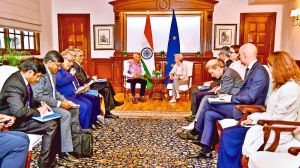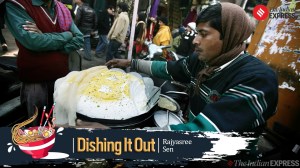It8217;s blasphemy, not Jihad
A war raged around Umayr ibn al-Humam in the battlefield of Badr, but he was at peace, eating a handful of dates. He heard the Prophet ma...

A war raged around Umayr ibn al-Humam in the battlefield of Badr, but he was at peace, eating a handful of dates. He heard the Prophet make this promise: quot;By him who holds Muhammad8217;s soul in his hands, not one who fights this day, if he has borne himself with steadfast courage, if he has gone forward and not back, shall meet his death without Allah8217;s bringing him into paradise.quot;
quot;Fine!quot; shouted out al-Humam, quot;Have I only to get myself killed by these men to enter into paradise?quot; He threw away his dates and, grasping his sword, plunged into the thick of the battle and was very soon killed.
Many Muslims have since than thought that any war characterised as Jihad by some of the ulema is a potential passport to Heaven. If you fight with enough fury and get yourself killed, you will be instantaneously in Heaven. And what could be more alluring than paradise, with its rivers of milk and honey and wine and an unlimited supply of beautiful houris?
This misunderstanding is so widespread thatPakistani propaganda has been able to convince some people from as far afield as Sudan and Bosnia, not to speak of Afghanistan and Pakistan Occupied Kashmir, that the massacre of innocent civilians including women and children in Jammu and Kashmir is an Islamic Jihad comparable to the battle of Badr.
The Pakistan killed a million Bengalis in 1970-71. It didn8217;t call it Jihad. Bangladeshis, too, killed Pakistanis in their struggle for independence. They too did not characterise it as Jihad. What makes the slaughter of the innocents in Kashmir Jihad is a question we must face, particularly now, after Prankote, Udhampur and Chapnari.
It is imperative that Muslims the world over look at the issue from a purely religious point of view, study their scriptures, and take a clear stand either for or against these mindless massacres that do not bear even the remotest connection with Jihad.
For all we know, the anecdote related above may be apocryphal. In any case, the Prophet had used the words, quot;one who fightsthis dayquot;. God too had permitted Muslims for the first time to fight in self-defence. Fourteen years after the beginning of Islam. Why?
Having faced relentless persecution for thirteen years at Mecca, the handful of people the Prophet had been able to convert had migrated to neighbouring Medina. The Meccans had attacked them there with a formidable army. The first Quranic verse that permits war is very significant. It specifically mentions the word quot;permissionquot; and then uses the passive voice, granting it only to those people against whom war is made. It talks about the special circumstances of Meccan Muslims.
It reads: quot;To those against whom war is made, permission is given to fight, because they were wronged8230; They are those who have been expelled from their homes in defiance of right, for no cause except that they say, Our Lord is Allah8217;.quot; 22:39-4C.
Thus fighting is permitted only in self-defence and at a time when not only the life of those handful of Muslims in Medina but the very existenceof Islam was in danger of extinction. For those few hundred Muslims represented the fruit of all of the Prophet8217;s exertion in the cause of God since he had become the Prophet fourteen years earlier.
Later Quranic verses set down the rules of war with a view to preserving the human rights of the civilian populations and prisoners of war. If Islam spread like wildfire in its initial years, it was largely because it had truly civilised the Bedouin population of Arabia.
The Muslims of today are, of course, not comparable to the Prophet8217;s companions. But we cannot allow Pakistan to denigrate the concept of Jihad in Kashmir. We owe it to our Faith. Characterising a slaughter of the innocents as Jihad is nothing short of blasphemy.
- 01
- 02
- 03
- 04
- 05































